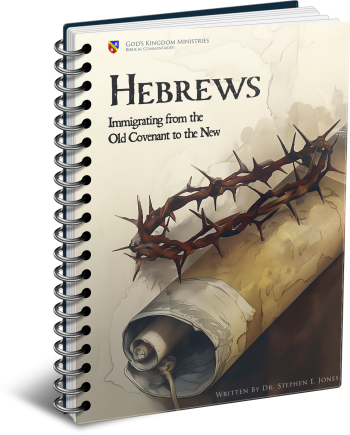Latest Posts
View the latest posts in an easy-to-read list format, with filtering options.

A chapter by chapter examination of the Book of Hebrews; this book examines the ways in which God has moved towards a better covenant with man. The historical background of the Book of Hebrews as well as contextual discussions add insight and relevance to Hebrews.
Category - Bible Commentaries

The book of Hebrews is a book about the better things that Jesus Christ brought to the world. The word “better” implies that Judaism was inferior to Christianity, and the appeal was for Hebrew people to adjust their view of God accordingly.
The book therefore presents Jesus Christ as the fulfillment of all the carnal types in the Aaronic system instituted by Moses. Never does it hint that Hebrew people ought to remain in Judaism, or that Hebrew Christians ought to draw their inspiration for worship from the temple in Jerusalem, its priesthood, or its sacrifices.
To be a true Hebrew was to be an immigrant, as the word implies. Paul uses the true meaning of the word Hebrew to inspire them to immigrate from Judaism to Christianity. He would have shaken his head in disbelief to hear some of the outrageous statements made by Christian ministers today, where they attempt to appease Jewish sensitivities by claiming that Jews are saved apart from Christ, if only they follow the law as good Jews. The entire book of Hebrews was written to refute such heresy.
The book was also inspired by the prophecy of Jesus that the city of Jerusalem would be destroyed because of its rejection of the Messiah. When Jesus quoted Jeremiah 7:11, saying of the temple in Matt. 21:13, “you are making it a robbers’ den,” He rendered the same verdict of God upon that place that had preceded Jerusalem’s destruction in the days of Jeremiah.
Paul knew how important it was for the early Church to gain its independence from the temple in Jerusalem. He also knew how important it was for the Church to be built upon the great principle of equality, forsaking the common Jewish idea that non-Jews were inferior beings and less qualified to approach God. The middle wall of partition (Eph. 2:14) had divided mankind long enough. It was abolished through Christ in order to create “one new man.”
Paul’s gospel was welcomed by the Greeks but hotly contested by the Jews, who did not want to give up their privileged place in God. Jews today still hate Paul for destroying this middle wall of partition, for the doctrine of equality destroyed the entire basis of their carnal aspirations to rule the world with all others being enslaved to them.
Paul did not destroy the law, but showed how the law had prophesied these things. He interpreted the law according to the mind of Christ, who was its Author. Yet in doing this, he showed where certain provisions of the law had been altered to conform to the new reality of the Pentecostal Age and the New Covenant.
The book of Hebrews was one of the most important books of the first century, when the Church was in its formative stage. The book has again become one of the most important books of today, made important because of the recent shift in Christian theology which seeks to reinstate the inherent inequality between Jew and non-Jew. The Dispensationalist idea that God will reinstate the Old Jerusalem, a Levitical Priesthood, and even animal sacrifices in the coming Kingdom Age also makes this book of paramount importance. So let us study it carefully, lest we leave the better things and reinstate that which is worse.